Unit 4 第三课时
Unit4Thisismyfamily第3课时课件(共30张PPT)

lion
lollipop
lamb
M, M, M, /m/, /m/, /m/. M is in ________.
mask
map
meat
N, N, N, /n/, /n/, /n/. N is in ________.
net
nine
noodles
O, O, O, /ɒ/, /ɒ/, /ɒ/. O is in ________.
Байду номын сангаас
fox
box
dog
P, P, P, /p/, /p/, /p/. P is in ________.
pig
pencil
pear
Reading Time
Read a picture book and pay attention to
the words with letters “Ll, Mm, Nn,
Find more words with Ll, Mm, Nn, Oo & Pp.
Read the chant.
F Read and Match
Ll
Mm
Nn
Oo
Pp
lemon milk nose orange pen
What does the first letter sound in a word? lemon milk nose orange pen
Let’s Read More
L, L, L, /l/, /l/, /l/. L is in ________.
Unit 4 This is my family
Parts (H & F)
湘少版·三年级上册
Quick Response
四年级上册英语教案-Unit4 These are flowers 第三课时 湘少版

四年级上册英语教案-Unit4 These are flowers 第三课时湘少版教学目标1.学生能够辨认出各色花朵,并且能够说出颜色名称。
2.学生能够使用简单的句型来描述花朵的颜色。
3.学生能够准确使用“We can see…”“It’s…”来表述。
4.培养学生的团队协作精神,并且培养学生的英语口语表达能力。
教学重点1.学生学会辨别出各色花朵,并且能够说出颜色名称。
2.学生学会使用简单的句型来描述花朵的颜色。
教学难点1.学生能够使用“We can see…”“It’s…”来表述。
2.学生能够准确使用颜色的英语单词来描述花朵。
教学过程Step 1 导入新课1.老师用PowerPoint或者图片展示各种花卉的图片,并且让学生猜出这些花朵的颜色。
老师可以适当设计一些互动环节,以便激发学生的兴趣。
2.老师提问:What color is this flower? (指着PPT上的某种花朵)学生回答后老师可以询问如下问题:How do you know? Can you tell us more about this flower’s color?Step 2 学生分组活动1.老师将学生分成小组,每组3-4人,由组长负责组织活动。
每组应包括至少两个英语较好的学生。
2.每组选定一种花朵图片,准备用英语来描述该花朵的颜色和命名。
组内成员应协作完成此任务,并在规定时间内完成任务。
3.每组提出描述该花朵颜色句式。
老师可以在此环节提醒学生准确使用“We can see..”“It’s…”等句式,并且ev encourage students to use colors which have not yet been presented.Step 3 组内展示和点评1.由每组组长来介绍该组所选取花卉的图片,并且描述该花卉的颜色和名称。
其他组员可以补充。
2.老师要及时点评每组表现,并给予肯定和指导,鼓励学生使用更多的英语单词。
PEP三上英语Unit 4第3课时Part A Letters and sounds优课教案

The third period(第三课时)Part A Letters and sounds▶教学内容与目标课时教学内容课时教学目标Letters and sounds ·能够听、说、读、写字母Jj, Kk, Ll, Mm, Nn·能够初步掌握这五个辅音字母作为单词首字母时的发音▶教学重点能够听、说、读、写字母Jj, Kk, Ll, Mm, Nn。
▶教学难点能够掌握这五个辅音字母的笔顺以及相关例词的发音。
▶教学准备教学课件、课文录音、视频、字母卡片等。
▶教学过程Step 1: Warm-up & Revision1. Greetings.T: Hi, boys and girls!Ss: Hello, Miss/ Mr…T: Good morning!Ss: Good morning!T: Let’s play letter games, OK?Ss: OK!2. Letter games.①(1) Find out the adjacent letters.T:(Show the letter card “D” to students.)Look! If I show you “D”, you should say “C” and “E” loudly. OK?Ss: OK!(The teacher shows different letter cards. Students say the adjacent letters.)(2) Sort the letters.(There are two groups of disordered letters “A~I” on the blackboard. The teacher asks a boy and a girl to compete to sort the letters from A to I. The other students are the judges. The faster one is the winner.) Teaching purpose①以游戏和chant的形式,复习已经学过的字母,激发学生学习字母的兴趣,同时也为接下来的新课的学习做铺垫。
Unit4第三课时

Unit4 Period Three学习目标:1.学习Unit 1新单词,从“hard-working”到“lucky”,准确地掌握这些单词及其用法。
2.预习Section B (P28 - 29)。
学习重难点:hope与wish, disappointed与disappointing的用法学习过程:一、掌握单词。
自学指导:1.根据音标读单词,从“hard-working”到“lucky”,不会读的单词用红笔标出来。
并将这些单词背过。
(4分钟)2.合上课本,做下列词汇题,检查对单词的灵活运用。
(3分钟)1). My English teacher said I was h________ .2). L_______, I passed my test.3). The old man is my g_______. I love him very much.4). Don’t be n_______ when you answer the teacher’s question.5). Alan’s story is t_______, we must believe him.6). I was _________ at the ______ news. (disappoint)7). I put the letter into the e___________ and had it mailed.(把它邮了)二、预习section B P29 3a内容(一) 快速读课文回答问题:(5分)1. What was wrong with his grandpa last week? ________________________________2. What did Alan get that day? ___________________________________________3. Which report was his worst one? ____________________________________________4. What did his history teacher say to him? ____________________________________(二)认真读课文,弄明白文章大意, 将不明白的句子划出。
Unit4 Our neighbors第三课时+教案+
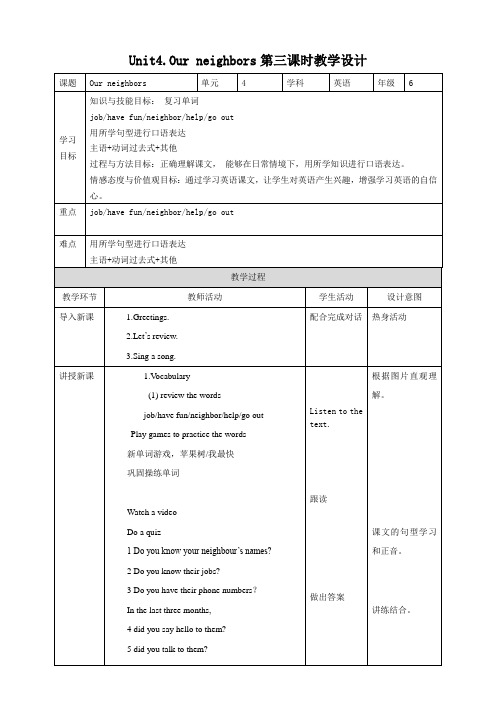
Unit.4Our neighbors
job/have fun/neighbor/help/go out
用所学句型进行口语表达
主语+动词过去式+其他
job/have fun/neighbor/help/go out
用所学句型进行口语表达
主语+动词过去式+其他
回忆所学,总结知识。
系统化学习,加深掌握。
承前启后,为下节课做准备。
课堂小结
本节课的教学任务是激发学生学习英语的兴趣,鼓励学生运用所学句型进行口语表达。增强其学习英语的自信心,寓教于乐,鼓励学生多与人交流,让学生感受轻松愉悦的英语课堂。
5 did you talk to them?
6 did you help them or did they help you?
7 did you go out or have fun together?
8 did you eat together?
Think and write
Learn the sounds
Unit4.Our neighbors第三课时教学设计
课题
Our neighbors
单元
4
学科
英语
年级
6
学习
目标
知识与技能目标: 复习单词
job/have fun/neighbor/help/go out
用所学句型进行口语表达
主语+动词过去式+其他
过程与方法目标:正确理解课文, 能够在日常情境下,用所学知识进行口语表达。
3.Sing a song.
配合完成对话
热身活动
讲授新课
1.Vocabulary
Unit 4 第三课时教学设计1.DOC

第三课时教学设计教学内容与分析①教学内容:A. Read and write Let's play C. Pronunciation②教学目标:a.能听、说、读、写句型:This is... What are you doing? I am...b.能听、说、认、读Read and write中的对话,帮助学生理解句子Do you want to go to the Children's Center?c.理解字母组合oo,ou,tr,tw的发音规则,试着朗读Pronunciation部分的例词。
教学重、难点分析①教学重点:掌握四会句型What are you doing? I am...②教学难点:正确拼写四会句型。
课前准备①教师准备living room,bathroom,Kitchen,study及bedroom的图片。
②教师准备小纸片和小盒子。
③教师准备录音机和录音带。
教学设计教学步骤建议与说明热身/复习(Warm-up/Review)①Let's play:学生围成一个圈,教师站中央,边说边做动作。
T:I'm doing the dishes. I'm reading a book. I'm answering the phone. I'm acting like a lion. (学生听到教师做凶猛动物的动作,纷纷跑开,被抓的学生进行下一轮的游戏)②Let's do:教师把living room,Kitchen,bathroom,study及bedroom的图片贴到黑板上,教师播放四年级上册第四单元A部分Let's do的录音,学生边说边做相应的动作。
通过游戏培养学生的听力及反应能力,使学生尽快进入学习的状态。
Go to the living room. Watch TV. Go to the study. Read a book.Go to the kitchen. Have a snack.Go to the bathroom. Take a shower. Go to the bedroom. Have a sleep.在说说、做做中复习旧知,为新授做铺垫。
苏教版译林小学英语unit4第三课时优秀课件

How is Miss Fox now?
注意:人A物c的t语it气o、动u作t 和表情哦!
farmer water paper cooker waiter bigger
My mother is a teacher. She works hard every day. My cousin is a worker. Now he’s on holiday.
Miss Fox gets angry. Why?
What do you think of Bobby?
What are Bobby and Sam talking about?
Who invented the aeroplane and the train?
发明
aeroplane
train
Brother Wright 莱特兄弟
Steven
ቤተ መጻሕፍቲ ባይዱ
What other inventions do you know?
你还知道哪些发明呢?
The Four Great Inventions of ancient China:
Papermaking
Printing
Gunpowder
Compass
Edison(爱迪生)
Fleming 弗莱明 penicillin 青霉素
Watt 瓦特 steam engine 蒸汽机
Bobby and Sam are having an English lesson.
人教版五年级英语上册Unit4Whatcanyoudo(第三课时BLet’stryLet’stalk
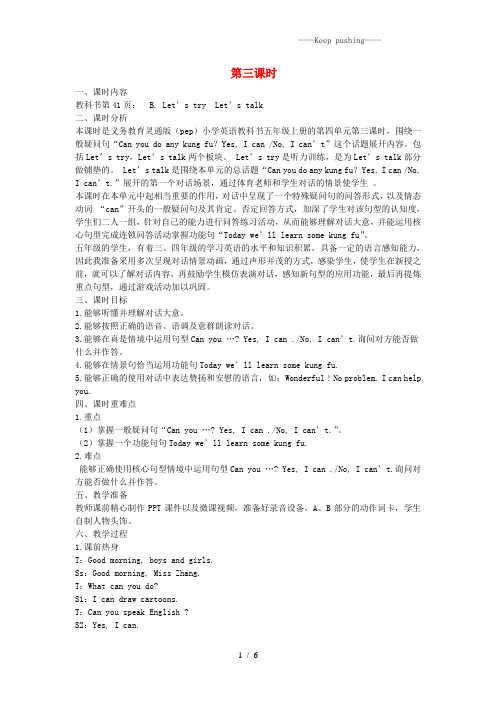
第三课时一、课时内容教科书第41页: B. Let’s try Let’s talk二、课时分析本课时是义务教育灵通版(pep)小学英语教科书五年级上册的第四单元第三课时,围绕一般疑问句“Can you do any kung fu?Yes, I can /No, I can’t”这个话题展开内容。
包括Let’s try,Let’s talk两个板块。
Let’s try是听力训练,是为Let’s talk部分做铺垫的。
Let’s talk是围绕本单元的总话题“Can you do any kung fu?Yes, I can /No, I can’t.”展开的第一个对话场景,通过体育老师和学生对话的情景使学生。
本课时在本单元中起相当重要的作用,对话中呈现了一个特殊疑问句的问答形式,以及情态动词“can”开头的一般疑问句及其肯定、否定回答方式,加深了学生对该句型的认知度,学生们二人一组,针对自己的能力进行问答练习活动,从而能够理解对话大意,并能运用核心句型完成连锁问答活动掌握功能句“Today we’ll learn some kung fu”。
五年级的学生,有着三、四年级的学习英语的水平和知识积累,具备一定的语言感知能力,因此我准备采用多次呈现对话情景动画,通过声形并茂的方式,感染学生,使学生在新授之前,就可以了解对话内容,再鼓励学生模仿表演对话,感知新句型的应用功能,最后再提炼重点句型,通过游戏活动加以巩固。
三、课时目标1.能够听懂并理解对话大意。
2.能够按照正确的语音。
语调及意群朗读对话。
3.能够在真是情境中运用句型Can you …? Yes, I can ./No, I can’t.询问对方能否做什么并作答。
4.能够在情景句恰当运用功能句Today we’ll learn some kung fu.5.能够正确的使用对话中表达赞扬和安慰的语言,如:Wonderful ! No problem. I can help you.四、课时重难点1.重点(1)掌握一般疑问句“Can you …? Yes, I can ./No, I can’t.”。
Unit 4 The Mid-Autumn Festival is coming 第三课时 课件
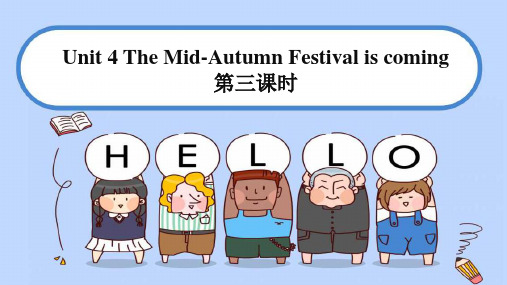
Word Bank
home. We __sa_t_d_o_w_n__to_g_e_t_h_er_ and
t_a_s_t_iv_a_l _. We enjoyed
talked about the festival
_e_a_t_in_g_m__oo_n_c_a_k_es__ and d_r_i_nk_i_n_g_t_ea__. My grandfather told _s_t_or_i_es__a_bo_u_t_t_h_e_m__oo_n_c_a_k_e_s . We were very interested in them.
--What do you enjoy doing on Mid-Autumn FestEivngalli?sh Poem
--We enjoy
looking at the moon eating mooncakes going shopping
drinking green tea reading poems
中秋节是我国的传统佳节,与春节、端午、清明并称为中国汉族的 四大传统节日。据史籍记载,古代帝王有春天祭日、秋天祭月的礼 制节期为农历即阴历八月十五,时日恰逢三秋之半,故名“中秋节 ”;又因这个节日在秋季、八月,故又称“秋节”、“八月节”; 又有祈求团圆的信仰和相关节俗活动,故亦称“团圆节”、“女儿 节”。中秋传说有:嫦娥奔月,吴刚折桂,玉兔捣药等。
Unit 4 The Mid-Autumn Festival is coming 第三课时
Let’s watch.
Let’s read.
The Moon
The moon is light. The moon is gold. The moon is like a boat. I want to sit in it.
Unit 4 第三课时教学设计2.DOC
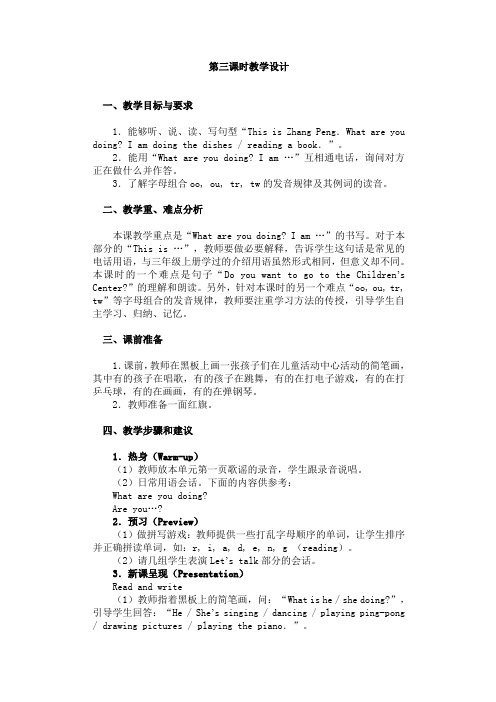
第三课时教学设计一、教学目标与要求1.能够听、说、读、写句型“This is Zhang Peng.What are you doing? I am doing the dishes / reading a book.”。
2.能用“What are you doing? I am …”互相通电话,询问对方正在做什么并作答。
3.了解字母组合oo, ou, tr, tw的发音规律及其例词的读音。
二、教学重、难点分析本课教学重点是“What are you doing? I am …”的书写。
对于本部分的“This is …”,教师要做必要解释,告诉学生这句话是常见的电话用语,与三年级上册学过的介绍用语虽然形式相同,但意义却不同。
本课时的一个难点是句子“Do you want to go to the Children’s Center?”的理解和朗读。
另外,针对本课时的另一个难点“oo, ou, tr, tw”等字母组合的发音规律,教师要注重学习方法的传授,引导学生自主学习、归纳、记忆。
三、课前准备1.课前,教师在黑板上画一张孩子们在儿童活动中心活动的简笔画,其中有的孩子在唱歌,有的孩子在跳舞,有的在打电子游戏,有的在打乒乓球,有的在画画,有的在弹钢琴。
2.教师准备一面红旗。
四、教学步骤和建议1.热身(Warm-up)(1)教师放本单元第一页歌谣的录音,学生跟录音说唱。
(2)日常用语会话。
下面的内容供参考:What are you doing?Are you…?2.预习(Preview)(1)做拼写游戏:教师提供一些打乱字母顺序的单词,让学生排序并正确拼读单词,如:r, i, a, d, e, n, g (reading)。
(2)请几组学生表演Let’s talk部分的会话。
3.新课呈现(Presentation)Read and write(1)教师指着黑板上的简笔画,问:“What is he / she doing?”,引导学生回答:“He / She’s singing / dancing / playing ping-pong / drawing pictures / playing the piano.”。
Unit 4 第三课时教学设计3.DOC
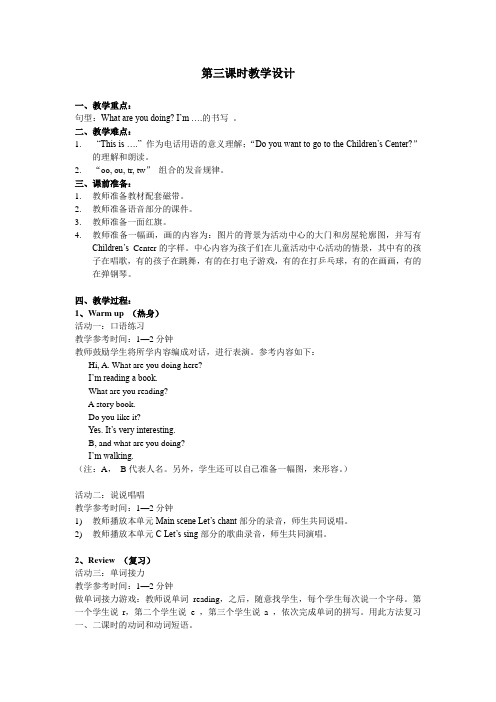
第三课时教学设计一、教学重点:句型:What are you doing? I’m ….的书写。
二、教学难点:1.“This is ….” 作为电话用语的意义理解;“Do you want to go to the Children’s Center?”的理解和朗读。
2.“oo, ou, tr, tw”组合的发音规律。
三、课前准备:1.教师准备教材配套磁带。
2.教师准备语音部分的课件。
3.教师准备一面红旗。
4.教师准备一幅画,画的内容为:图片的背景为活动中心的大门和房屋轮廓图,并写有Children’s Center的字样。
中心内容为孩子们在儿童活动中心活动的情景,其中有的孩子在唱歌,有的孩子在跳舞,有的在打电子游戏,有的在打乒乓球,有的在画画,有的在弹钢琴。
四、教学过程:1、Warm up (热身)活动一:口语练习教学参考时间:1—2分钟教师鼓励学生将所学内容编成对话,进行表演。
参考内容如下:---- Hi, A. What are you doing here?---- I’m reading a book.---- What are you reading?---- A story book.---- Do you like it?---- Yes. It’s very interesting.---- B, and what are you doing?---- I’m walking.(注:A,B代表人名。
另外,学生还可以自己准备一幅图,来形容。
)活动二:说说唱唱教学参考时间:1—2分钟1)教师播放本单元Main scene Let’s chant部分的录音,师生共同说唱。
2)教师播放本单元C Let’s sing部分的歌曲录音,师生共同演唱。
2、Review (复习)活动三:单词接力教学参考时间:1—2分钟做单词接力游戏:教师说单词reading,之后,随意找学生,每个学生每次说一个字母。
人教版Unit 4 Asking for Help(第三课时)四年级英语辅导PPT

want more foosson 3 Helping Hands
学习 目标
1. 借助图片读懂绘本, 了解在日常生活中遇 到困难时如何求助。
2. 能够积极回应亲友 的求助,养成互帮互 助的好习惯。
01 Read the cover.
When
When do you need help?
人教版Unit 4 Asking for Help(第三课 时)四年级英语辅导PPT
年 级:四年级
学 科:英语(人教版)
Unit 4 Asking for Help(第三课时)
年 级:四年级 学 科:英语(人教版)
Borrow things.
too high
太高
四年级 英语
四年级 英语
too heavy
02 Let’s read.
When do you need help?
03 Let’s chant.
04 Look and talk.
Who else can you ask for help?
How can you ask for help?
05 Let’s help.
Ask politely. Tell the reason. Be grateful.
Ask politely. Tell the reason. Be grateful.
Ask politely. Tell the reason. Be grateful.
• Excuse me.
• Can you give me a hand, please?
• Can you help me, please?
Thank you.
hurt
Ask politely. Tell the reason. Be grateful.
Unit4第3课时Grammar(知识精讲分层练习)(学生版)
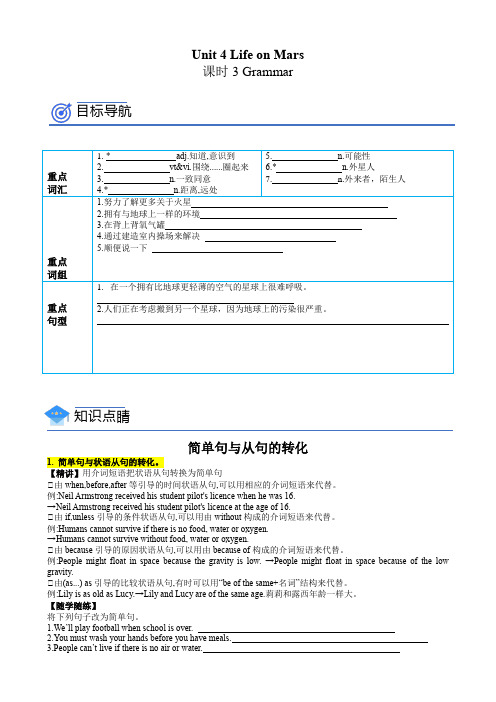
Unit 4 Life on Mars课时3 Grammar简单句与从句的转化1. 简单句与状语从句的转化。
【精讲】用介词短语把状语从句转换为简单句①由when,before,after 等引导的时间状语从句,可以用相应的介词短语来代替。
例:Neil Armstrong received his student pilot's licence when he was 16.→Neil Armstrong received his student pilot's licence at the age of 16.①由if,unless 引导的条件状语从句,可以用由without 构成的介词短语来代替。
例:Humans cannot survive if there is no food, water or oxygen.→Humans cannot survive without food, water or oxygen.①由because 引导的原因状语从句,可以用由because of 构成的介词短语来代替。
例:People might float in space because the gravity is low. →People might float in space because of the low gravity.①由(as...) as 引导的比较状语从句,有时可以用“be of the same+名词”结构来代替。
例:Lily is as old as Lucy.→Lily and Lucy are of the same age.莉莉和露西年龄一样大。
【随学随练】将下列句子改为简单句。
1.We’ll play football when school is over.2.You must wash your hands before you have meals.3.People can’t live if there is no air or water.重点词汇1. * adj.知道,意识到2. vt&vi.围绕......圈起来3. n.一致同意4.* n.距离,远处5. n.可能性6.* n.外星人7. n.外来者,陌生人重点词组1.努力了解更多关于火星2.拥有与地球上一样的环境3.在背上背氧气罐4.通过建造室内操场来解决5.顺便说一下重点句型 1. 在一个拥有比地球更轻薄的空气的星球上很难呼吸。
五年级英语下册-Unit4 第3课时 A Let's spell【教案】

五年级英语(下)第4单元第3课时Unit 4 When is Easter?Let’s spell一、【教材分析】二、【教学流程】(播放课本chant.)(呈现填空中的单词)T:Look, those are the words in the chant. They are all “th” words. Can u read them? (生齐读单词) let’s read together.Now you can read them, can you guess what is “th” sounds like?(生猜测th 发音)T: I have two choices for you. Listen A or B (生听音选择th 发音)教读TH 发音并板书。
[θ]T:Put your tongue out of your mouth, tip tongue, now , show me your hands, touch here. Then th [θ] , can you feel the vibration? No ,that’s right. So th [θ] .2、(出示chant中的四个单词即课本四个单词)Now, look at the four words, how many sounds are there? Could you please read and talk with your partner?(生讨论每个单词有几个音)(师生一起使用自然拼读法拼读以上单词)3、So we know th [θ]What about this : thin ---and think (请生认读th new words) Thirsty、thick、thrust、mouth、birth、bath.4、T:th [θ] so let’s spell this word,拼读mother 找到矛盾点And th has another sound , can you guess what else does it sounds like? (生猜测另一发音)T:So what else does th sounds like? Listen and watch.(观看Th 发音动画)So th [ð] vibration (教读发音对比[θ]的发音练习)th[θ] no vibration.Now let’s spell “mother” one more time.(继续认读new words) Either、further、this 、that、than、with.4、Can you say some words with “th”?5.Let’s chant.【设计意图:通过改编的课本chant,呈现本课相同的单词的字母组合发音,在有意义的chant学习中,学生通过教师提出的问题主动思考,又通过图片,听音等形式获得新知,学习积极性比较高。
Unit 4 第三课时教学设计1.DOC

第三课时教学设计一、教学目标与要求1.能够听懂、会读Let’s read中信的内容并独立完成信后的书写练习。
2.能够完成Let’s find out部分的练习。
3.能够听懂、会唱歌曲“A Trip to China”。
二、教学重、难点分析1.本课时的教学重点是能读懂Let’s read部分的一封信。
2.本课时的教学难点是能正确认读下列句子:Every day I had fun with my cousins.On Monday we went to a restaurant.Tomorrow I'll be back home.三、课前准备1.教师准备录音机及本课时的录音带。
2.教师准备A Let’s learn部分的动词短语卡片和五年级下册第四、五、六单元Let’s learn部分的单词卡片。
四、教学步骤和建议1.热身(Warm-up)教师放前一课时学过的歌谣,学生边做动作边跟录音说唱。
2.预习(Preview)(1)日常口语练习,以下内容供参考:T:What day is it today?S:It’s….T:What are you going to do this weekend?S:I am going to….T:Have a good time!S:Thank you.T:I will…this weekend.教师告诉学生be going to和will意思相近,多数情况下可以互换使用。
(2)教师让学生用句型“I am going to…this weekend.”或者“I will…this weekend.”造句。
3.新课呈现(Presentation)Let’s read(1)教师问:“What did you do last Saturday?”学生回答:“I….”教师指导学生用单词last组词,如:last week,last month,last year等。
人教版PEP五年级上册英语《Unit 4What can you do第三课时》教案

人教版PEP五年级上册英语《Unit 4What can you do第三课时》教案一. 教材分析本课是PEP人教版五年级上册英语Unit 4 What can you do第三课时,本课主要围绕“询问和介绍人们能做什么”的主题展开。
通过本课的学习,学生能够进一步掌握询问和介绍人们能力的相关句型,提高实际运用英语进行交流的能力。
二. 学情分析五年级的学生已经掌握了基本的英语语法和词汇,具备一定的听说读写能力。
但对于一些复杂的动词短语和情态动词的用法可能还不太理解,因此需要在教学中进行重点讲解和操练。
三. 教学目标1.能够听懂、会说、会读关于询问和介绍人们能力的相关句型。
2.能够运用所学的动词短语和情态动词进行简单的交流。
3.培养学生的合作意识和团队精神。
四. 教学重难点1.动词短语的理解和运用。
2.情态动词can的用法。
3.如何在实际交流中正确使用所学的句型。
五. 教学方法采用任务型教学法,通过创设情境,引导学生主动参与,合作完成任务。
同时运用游戏教学法,激发学生的学习兴趣,提高学生的学习积极性。
六. 教学准备1.教学课件2.动词短语卡片3.情态动词卡片4.录音机和磁带七. 教学过程1.导入(5分钟)通过歌曲“What can you do?”来调动学生的学习氛围,让学生在轻松愉快的氛围中进入课堂。
2.呈现(10分钟)教师通过课件展示本课的主题,引导学生学习关于询问和介绍人们能力的相关句型。
同时,教师可以通过动作展示一些动词短语,如“sing a song”、“dance a dance”等,帮助学生理解和记忆。
3.操练(10分钟)学生分角色扮演,模拟真实场景,运用所学的句型进行问答。
教师可以通过分组比赛的方式,激发学生的学习兴趣,提高学生的口语表达能力。
4.巩固(5分钟)教师发放任务单,学生分组完成任务。
任务内容包括:用所学的句型询问小组成员能做什么,并将答案写在任务单上。
完成后,教师选取部分任务单进行展示和评价。
- 1、下载文档前请自行甄别文档内容的完整性,平台不提供额外的编辑、内容补充、找答案等附加服务。
- 2、"仅部分预览"的文档,不可在线预览部分如存在完整性等问题,可反馈申请退款(可完整预览的文档不适用该条件!)。
- 3、如文档侵犯您的权益,请联系客服反馈,我们会尽快为您处理(人工客服工作时间:9:00-18:30)。
Part B Let's learn
学习目标
1.能听、说、读、写单词或词组: ice-skate, play badminton, go cycling。 2.能听、说、认读句子: I didn’t like winter before. I thought it was too cold, and I couldn’t go cycling. How about now? Now I love to ice-skate and play in the snow. 并能在实际情境中运用。
Testing
一、看图说短语
二、根据首字母提示完成下列各题: 1. There was no g___ im my school ten years a___. 2. We can play football on the g___. 3. I go c___ every day. 4. I love to i___ and play in the s___. 5.Mike often plays b___ after school.
文字内容 文内容 文字内容
Let‘s revise(复习)
翻译(词组): 1. 五年前 2. 三个月前 3.去年 4.上 个月 5.在互联网上 6.在学校 7. 查阅 8.非 常容易 9.一个小时之前
Let‘s revise(复习)
翻译(词组): 1. 五年前 five years ago 2. 三个月前 three moths ago 3.去年 last year 4.上个月 last month 5.在互联网上 on the Internet 6.在学校 at school 7. 查阅 look up 8.非常容易 So easy 9.一个小时之前 an hour ago
Learning aims
1.能够听说读写单词: 去骑自行车 go cycling 滑冰 ice-skate 打羽毛球 play badminton 2. 能够听说认读句子: I didn‘t like winter before. I thought it was too cold, and I couldn't go cycling. Now I love to ice-skate, so I like winter.
翻译(句子) ①我以前的学校里没有图书馆。 ②请给我们介绍一下你们的学校。 ③你怎么知道那个的? ④我那时候没有电脑也没有网络。 ⑤20年前我的学校每天饭厅,现在有一个新的了。
Free talk
Tell us about your old school, please.
参考句型:There was/ were no .... .... 参考词汇:library、dining hall、computer room、 multimedia room、Internet、computer Eg:There was no Internet in my old school 5 years ago. There were no computers in my old school 5 years ago.
三、单项选择: 1. Before, I ___ like maths. A. didn't B. don't C. doesn't 2. I like ___ cycling. A. go B. to going C. to go 3. He ___ badminton every week. A. play B. plays C. plaies 4. Amy ___ TV every evening. A. doesn't watch B. doesn't watches C. didn't watch
I Can….. 我会。。。。 (can ,“能,会”,情态动词,后 跟动词原形。) I can sing. I can dance. I can Kungfu.
Ice-skate, ice-skate, I can ice-skate.
Play badminton, play badminton, I can play badminton.
Read and recite
Wu yifan: I didn't like winter before. I thought it was too cold, and I couldn't go cycling. Mike: How about now?
Wu yifan: Now I love to ice-skate, so I like winter.
Could与can (过去能与现 在能) 用“ Before, I couldn‘t .... Now, I can... ...” 造句 (could 与can 后面的动词要用原形) Eg: Before, I couldn‘t play ping-pong. Now I play ping-pong everyday.
Read and recite
Wu yifan: 我以前不喜欢冬天. 我认为天气太冷,并且我不能去骑 自行车。 Mike: 现在呢?
Wu yifan: 现在我喜爱滑冰, 所以我喜欢 冬天.
Listen、match and say
Before, Allen couldn't ....
Now ... ...
There is /was +单数名词/不可数名 词。 There are/ were+名词的复数形式。 " There be" 句型 There __ an English class every day. There __ two Chinese classes today. There __ an English class and two Chinese classes today.
